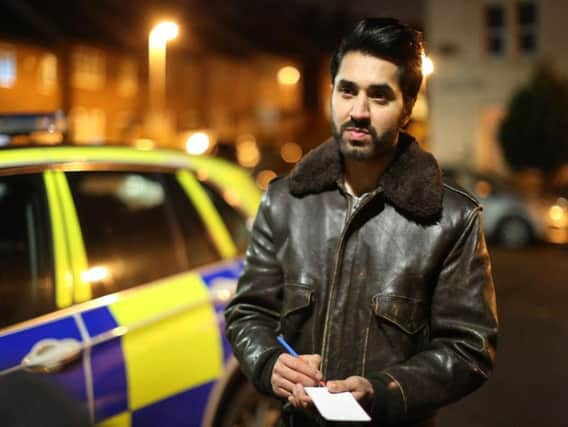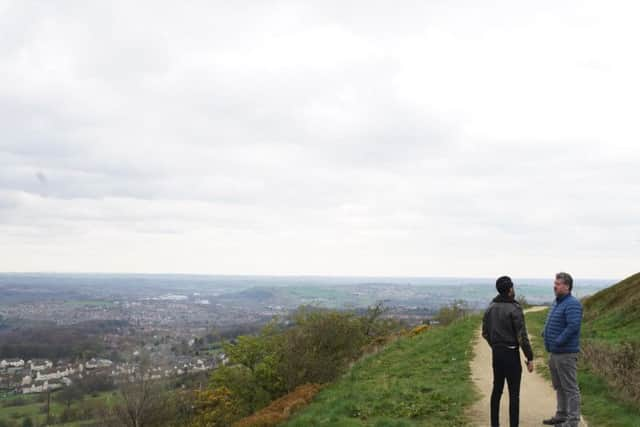'My hometown of Huddersfield has a dark side of drugs and violence'


The violence, drug disputes and criminal underworld that faced Mobeen Azhar when he returned to his hometown were a far cry from the ‘sleepy’ community he recalls growing up in.
He spent the first 18 years of his life in the suburb of Birkby in Huddersfield and was drawn back to the West Yorkshire town following the shooting of Yassar Yaqub by police in January 2017.
Advertisement
Hide AdAdvertisement
Hide AdJournalist Mobeen returned to report on the events surrounding the death, but says he was soon led to confront “the painful truth” that his “calm and happy” hometown now appeared to be a hotbed of violence, gangs and drug dealing.


Flying Scotsman fans urged to stay off railway tracks as iconic engine gets set for Yorkshire return
“Whilst living back in Huddersfield, there were weekly, sometimes daily, gun and knife-related incidents taking place in the streets I grew up in,” he says.
Advertisement
Hide AdAdvertisement
Hide Ad“I spent a lot of time on crime scenes, around police tape and flashing lights. This felt very different to the calm, friendly and somewhat sleepy town I remember.
“My conversations at these crime scenes followed a very similar pattern. Onlookers, neighbours and witnesses would tell me that these incidents involved young men.
“There were often allegations of the violence being rooted in drug disputes. This became a constant theme.”
FearYassar was 28 when he was shot on an M62 sliproad. Earlier this year, Leeds Crown Court heard he had met with Bradford rival Mohammed Nisar Khan, known as Meggy, earlier that evening to resolve a drugs dispute.
Advertisement
Hide AdAdvertisement
Hide AdMobeen says when he told people his reason for being back in the town, many became uncomfortable and he found he was greeted with a wall of silence.
“My (words), and particularly the name Yassar Yaqub, were like kryptonite,” he writes in a piece for the BBC.
“Over and over again, people I knew and trusted would explain that they wouldn’t want to be seen to say anything...
“When I’d ask for an explanation, the conversation would stand still. I could see fear in their eyes. Some people even said I should be careful about what I was getting myself into. I knew the case had everyone talking, so why the silence?”
Regular violence
Advertisement
Hide AdAdvertisement
Hide AdAs Mobeen spent more time in Huddersfield, he was shocked by the regularity of violence, the number of stabbings and shootings and the realisation too that he had a personal connection to some people who had been affected.
He says he saw more police tape in the area than he had ever seen in London, and one resident he spoke to said things were getting so out of control, that “you can’t pop down to the shop without a bulletproof vest anymore”.
“The crime scenes I visited were more often than not linked to alleged perpetrators and victims, who were overwhelmingly young British Pakistani men involved in the drugs trade,” he says.
It led him to explore the links between British Pakistanis in Yorkshire and the national and international drugs trade, meeting runners, dealers and importers, who told him the majority of heroin being sold in Britain was coming from Pakistan.
Advertisement
Hide AdAdvertisement
Hide AdThe former Head of Drugs Threat and Intelligence at the National Crime Agency said whilst Pakistani criminals were significant to UK heroin trafficking, they were not the sole traders.Mobeen says: “(A Freedom of Information request revealed) British Pakistanis make up a minority of those convicted for dealing class A drugs in the UK, but we uncovered that the British Pakistani community is over-represented when it comes to convictions for dealing Class A drugs in the Yorkshire and Humber area.”
Mobeen, whose near two-year investigations and return to Huddersfield have been turned into a documentary series for the BBC, says he was “shocked and saddened” by the “hypocrisy and immorality” of some dealers and their justifications for selling drugs.
Human cost
“I was disgusted by the disregard and disengagement for the human cost of the drugs trade,” he says. “There is nothing admirable about making money from other people’s misery.”In his piece for the BBC, he adds: “I even heard anecdotes about wholesale heroin prices going up around the Muslim holy month of Ramadan as dealers put their business on ice.”
Whilst he found the majority of people he met wanted an end to the drugs trade and the violence seemingly linked to it, he claims there is a reluctance to speak out for fear of retribution and that many people feel powerless. It means, he says, there is a culture of turning a blind eye.
Advertisement
Hide AdAdvertisement
Hide Ad“I met parents who were anxious and unsure about the right way in which to tackle the criminality of their sons. I learnt that there can sometimes be a willingness to ignore warning signs.
“For instance, if a young man with no qualifications or employment is coming home with designer clothes and a car, questions should be asked. The parents I met were unsure about how best to tackle these issues.
“I also know many people within the British Pakistani community feel attacked by the far right and by negative portrayals of the community. Huddersfield generally, and the British Pakistani community more specifically, has had a difficult time in the Press and that means sections of the community are more focused on challenging this perception than addressing core problems.”
Positive action
But whilst conversations may be difficult, work is under way to try to make a difference. In the programme, Mobeen meets a former Bradford drug dealer, known as Naz, who is trying to prevent young people from following in his footsteps, and Imam Alyas Karmani, a community leader heading up the charge against drugs and violence in Yorkshire.
Advertisement
Hide AdAdvertisement
Hide Ad“I want people to engage with the difficult questions the series raises,” he says. “Some of it makes uncomfortable viewing but that is exactly why I think it is valuable.
“All communities have issues that need to be tackled. Huddersfield is no different. I would like viewers to understand the human cost of the drugs trade and engage with why so many young British Pakistani men are involved in my hometown.
“The death of Yassar Yaqub was tragic. We can all agree that his life should not have ended in the way it did.
“I hope that something positive can be taken from such an unfortunate situation. I would like the series to help instigate what I believe is an overdue conversation.”
The full BBC Three documentary series of Hometown: A Killing is available now on iPlayer. The first two episodes aired on BBC One last week and the series continues on the channel tomorrow night.